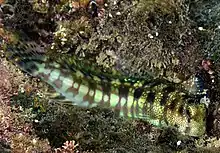| Blenniella gibbifrons | |
|---|---|
 | |
| Scientific classification | |
| Domain: | Eukaryota |
| Kingdom: | Animalia |
| Phylum: | Chordata |
| Class: | Actinopterygii |
| Order: | Blenniiformes |
| Family: | Blenniidae |
| Genus: | Blenniella |
| Species: | B. gibbifrons |
| Binomial name | |
| Blenniella gibbifrons | |
| Synonyms[2] | |
| |
Blenniella gibbifrons, also known as the hump-headed blenny, bullethead rockskipper or picture rockskipper, is a species of combtooth blenny found in coral reefs in the Pacific and Indian Oceans from East Africa in the west to the Hawaiian, Line and Ducie Islands, in the east and north to Marcus Island.[2]
It was first recorded by French biologists Quoy and Gaimard in 1824.[3][4]
Biology
Blenniella gibbifrons inhabit the shallow water near the shore of intertidal reef flats. They prefer water from 0.5 to 1.5 m deep where the substrate consists of a thin carpet of algal turf and sand. They inhabit the water layer immediately above the bottom (benthic) . They are Oviparous with the eggs and young left to fend for themselves. Eggs are adhesive and are attached to the bottom by a threadlike, adhesive pad or pedestal . Larvae are planktonic and often found swimming in shallow, coastal waters.[5][6]
References
- ↑ Williams, J.T. (2014). "Blenniella gibbifrons". IUCN Red List of Threatened Species. 2014: e.T48342422A48375114. doi:10.2305/IUCN.UK.2014-3.RLTS.T48342422A48375114.en. Retrieved 20 November 2021.
- 1 2 Froese, Rainer; Pauly, Daniel (eds.) (2013). "Blenniella gibbifrons" in FishBase. February 2013 version.
- ↑ "Blenniella gibbifrons". Integrated Taxonomic Information System. Retrieved 9 January 2022.
- ↑ Voyage autour du monde … pendant les années 1817, 1818, 1819 et 1820 (with Louis Claude Desaulses de Freycinet, Jean René Constant Quoy, et al.), 1824.
- ↑ Springer, V.G. and J.T. Williams, 1994. The Indo-West Pacific blenniid fish genus Istiblennius reappraised: a revision of Istiblennius, Blenniella, and Paralticus, new genus. Smithson. Contrib. Zool. 565:1-193. (Ref. 9962)
- ↑ "Blenniella gibbifrons". WoRMS. World Register of Marine Species. Retrieved 9 January 2022.
